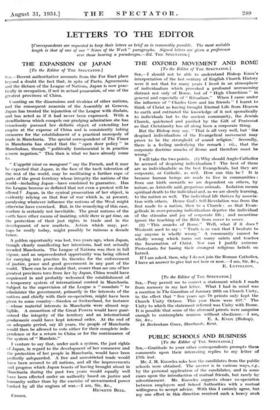THE OXFORD MOVEMENT AND ROME [To the Editor of TILE
SexerNroa.] Sia,—I should not be able to understand Bishop Knox's interpretation of the last century of English Church History were it not that for many years I lived in an atmosphere of individualism which provoked a profound unreasoning distrust not only of Rome, but of " High Churchism " in general and especially of " Ritualism." When I came under the influence of " Charles Gore and his friends " I learnt to think of Christ as having brought Eternal Life from Heaven to earth and entrusted the knowledge of it not sporadically to individuals but to the ancient community, the Jewish Church, quickened and purified by the Gift of Pentecost so that Christianity has all along been a corporate thing.
But the Bishop may say, " That is all very well, but the despised individualism of the Evangelical movement may prove to be the stronghold of sound religion.' Secondly, there is a feeling underlying the remark : viz., that the corporate doctrine smacks of Rome and therefore must be wrong."
I will take the two points. (1) Why should Anglo-Catholics be accused of despising individualism ? The best of them are as individualistic as the best Evangelicals, but they are corporate, or Catholic, as well. How can this be ? It is because human beings are made to live in communities : from our birth onwards we are dependent on others, by nature, as Aristotle said, gregarious animals. Isolation means spiritual death to the individual and, as we are slowly learning, to the nation as well. The individual life thrives by associa- tion with others. Hence God's Self-Revelation was from the first made to a nation, then to a Church : so that Evan- gelicals in over-pressing individualism deprive the individual of the stimulus and joy of corporate life ; and meantime ignore the teaching of the Bible from cover to cover.
(2) " This smacks of Rome." Well, what it it does ? Westcott used to say : " Truth is so vast that I hesitate to say anyone is wholly wrong." A community cannot be wholly wrong which turns out many saints and teaches the Incarnation of Christ. Nor can I justify extreme Protestants for basing their strongest religious beliefs on hatred.
If I am asked, then, why I do not join the Roman Catholics, I have an answer to give but not here or now.—I am, Sir, &c., E. LYTTELTON.






































 Previous page
Previous page